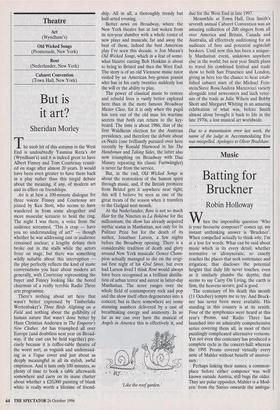Theatre
Art (Wyndham's) Old Wicked Songs (Promenade, New York) Rent (Nederlander, New York) Cabaret Convention (Town Hall, New York)
But is it art?
Sheridan Morley
T he snob hit of this autumn in the West End is undoubtedly Yasmina Reza's Art (Wyndham's) and it is indeed great to have Albert Finney and Torn Courtenay reunit- ed on stage after almost 20 years. It would have been even greater to have them back in a play rather than this turgid debate about the meaning, if any, of modern art and its effect on friendships.
Art is at best a 100-minute dialogue for three voices: Finney and Courtenay are joined by Ken Stott, who seems to have wandered in from some altogether and more muscular scenario to hold the ring. The night I was there, a voice from the audience screamed, 'This is crap — have you no understanding of art?' — though whether he was addressing cast or audience remained unclear; a lengthy debate then broke out in the stalls while the actors froze on stage, but there was something wildly suitable about this interruption the play perfectly reflects the kind of inane conversations you hear about modern art generally, with Courtenay representing the buyer and Finney looking like the bored chairman of a really terrible Radio Three arts programme.
There's nothing about art here that wasn't better expressed by Timberlake Wertenbaker's Three Birds Alighting on a Field and nothing about the gullibility of human nature that wasn't done better by Hans Christian Andersen in The Emperor's New Clothes. Art has triumphed all over Europe (and doubtless next year on Broad- way, if the cast can be held together) pre- cisely because it is coffee-table theatre of the worst sort, as voguish and undemand- ing as a Vogue cover and just about as deeply meaningful in all its stylish, awful emptiness. And it lasts only 100 minutes, so plenty of time to book a table afterwards somewhere and carry on its inane chatter about whether a £20,000 painting of blank white is really worth a lifetime of friend-
ship. All in all, a thoroughly trendy but half-arted evening.
Better news on Broadway, where the New York theatre has at last woken from its ten-year slumber with a whole roster of new plays and musicals; far and away the best of these, indeed the best American play I've seen this decade, is Jon Maran's Old Wicked Songs, which in a feat of some- what bizarre casting Bob Hoskins is about to bring to Bristol and then the West End. The story is of an old Viennese music tutor visited by an American boy-genius pianist who has in his early twenties suddenly lost the will or the ability to play.
The power of classical music to restore and rebuild lives is vastly better explored here than in the more famous Broadway Master Class, for it is only when the pupil has torn out of the old man his wartime secrets that both can return to the key- board. The time is about 1986, that of the first Waldheim election for the Austrian presidency, and therefore the debate about ex-Nazis (one brilliantly pursued over here recently by Ronald Harwood in his The Handyman and Taking Sides, the latter also now triumphing on Broadway with Dan Massey repeating his classic Furtwangler) is never far from the service.
But, in the end, Old Wicked Songs is about the restoration of the human spirit through music, and, if the British premiere from Bristol gets it anywhere near right, this will I believe be seen as one of the great treats of the season when it transfers to the Gielgud next month.
At the Nederlander, Rent is not so much Hair for the Nineties as La Boheme for the millennium; the show has already acquired mythic status in Manhattan, not only for its Pulitzer Prize but for the death of its author, Jonathan Larson, a few nights before the Broadway opening. There is a considerable tradition of death and glory around New York musicals: Gower Cham- pion actually managed to die on the origi- nal first night of his 42nd Street, but even had Larson lived I think Rent would always have been recognised as a brilliant distilla- tion of urban terror and unrest in latter-day Manhattan. The score ranges over the whole field of contemporary rock and pop and the show itself often degenerates into a concert; but in there somewhere are some stunning numbers delivered by a cast of breathtaking energy and animosity. In so far as we can ever have the musical of Angels in America this is effectively it, and `Like the roof garden.' due for the West End in late 1997.
Meanwhile at Town Hall, Don Smith's seventh annual Cabaret Convention was an amazing collection of 200 singers from all over America and Britain, Canada and Australia, all effectively auditioning for an audience of fans and potential nightclub bookers. Until now this has been a unique- ly Manhattan event, unknown anywhere else in the world; but next year Smith plans to travel his combined festival and trade show to both San Francisco and London, giving us here too the chance to hear estab- lished cabaret stars of the Michael Fein- stein/Steve Ross/Andrea Marcovicci variety alongside total newcomers and such veter- ans of the trade as Julie Wilson and Bobby Short and Margaret Whiting in an amazing celebration of what was, before Smith almost alone brought it back to life in the late 1970s, a lost musical art worldwide.
Due to a transmission error last week, the name of the judge in Accommodating Eva was misspelled. Apologies to Oliver Bradshaw.


















































































 Previous page
Previous page